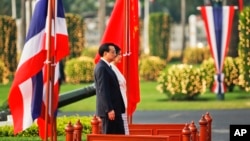BANGKOK —
Thailand and China have moved to further strengthen bilateral economic ties during an official visit by China's Premier Li Keqiang, who kicked off the trip by addressing parliament on Friday.
The first of Li's three-day visit was also highlighted by the signing of several economic and trade agreements during talks with Thai Premier Yingluck Shinawatra.
Thailand is the country coordinator for promoting relations between China and the Association of South East Asian Nations, or ASEAN. Officials said agreements were reached on investment, infrastructure cooperation, science and technology, energy, marine cooperation, education and culture.
Thailand has been building relations with China, especially during the government of Prime Minister's Yingluck's brother, Thaksin Shinawatra, who was ousted in a 2006 coup.
Carl Thayer, a professor of politics in Australia, says Thai governments over time have built strong economic and business relationships with China, and while Thailand still has long-standing military ties with the United States, the Thai Government seeks a balance.
"The Bangkok-based governments have leaned towards China economically very solidly, [but] Thailand is trying to hold down both relationships and keep the military side as low key as possible," he said.
In a rare opportunity, Premier Li addressed the Thai parliament after he attended the ASEAN leaders' summit in Brunei. Thitinan Pongsudhirak, a political scientist at Chulalongkorn University, says while Thailand's relationship with the U.S. appears to be "drifting," its ties with China are building.
"So the bilateral relationship between Bangkok and Beijing is deepening, widening in all sorts of ways and not just economic and political, but also militarily as well," he said. "The Chinese now offer more scholarships and funds for Thai military officers to be trained and study in China, and that goes also for Thai students to study in China."
Chinese investors are increasingly taking a large role in the Thai economy. Between 2007 and 2012, Chinese companies invested almost $6 billion in projects under Thailand's special investment tax privileges for foreign investors. In the first eight months of 2013, 28 Chinese investment projects totaling $580 million made applications to invest in Thailand. China is now Thailand's largest source of foreign direct investment after Japan.
Thitinan says China's leadership is deepening existing relations with countries such as Burma, Thailand, Laos and Cambodia, which are seen as "orbiting closer to China." He says Beijing hopes to reduce conflict with the region about disputed claims over resource-rich areas in the South China Sea.
"They also want to build relationships with strategic partnerships in Indonesia, Malaysia, [and] Singapore," he said. "They also want to repair the damages that have been done to relationships with disputed countries — the countries that they have disputes with in the South China Sea — mainly the Philippines and Vietnam."
While in Thailand, Premier Li will also visit to the northern city of Chiang Mai before traveling to Vietnam Sunday.
The first of Li's three-day visit was also highlighted by the signing of several economic and trade agreements during talks with Thai Premier Yingluck Shinawatra.
Thailand is the country coordinator for promoting relations between China and the Association of South East Asian Nations, or ASEAN. Officials said agreements were reached on investment, infrastructure cooperation, science and technology, energy, marine cooperation, education and culture.
Thailand has been building relations with China, especially during the government of Prime Minister's Yingluck's brother, Thaksin Shinawatra, who was ousted in a 2006 coup.
Carl Thayer, a professor of politics in Australia, says Thai governments over time have built strong economic and business relationships with China, and while Thailand still has long-standing military ties with the United States, the Thai Government seeks a balance.
"The Bangkok-based governments have leaned towards China economically very solidly, [but] Thailand is trying to hold down both relationships and keep the military side as low key as possible," he said.
In a rare opportunity, Premier Li addressed the Thai parliament after he attended the ASEAN leaders' summit in Brunei. Thitinan Pongsudhirak, a political scientist at Chulalongkorn University, says while Thailand's relationship with the U.S. appears to be "drifting," its ties with China are building.
"So the bilateral relationship between Bangkok and Beijing is deepening, widening in all sorts of ways and not just economic and political, but also militarily as well," he said. "The Chinese now offer more scholarships and funds for Thai military officers to be trained and study in China, and that goes also for Thai students to study in China."
Chinese investors are increasingly taking a large role in the Thai economy. Between 2007 and 2012, Chinese companies invested almost $6 billion in projects under Thailand's special investment tax privileges for foreign investors. In the first eight months of 2013, 28 Chinese investment projects totaling $580 million made applications to invest in Thailand. China is now Thailand's largest source of foreign direct investment after Japan.
Thitinan says China's leadership is deepening existing relations with countries such as Burma, Thailand, Laos and Cambodia, which are seen as "orbiting closer to China." He says Beijing hopes to reduce conflict with the region about disputed claims over resource-rich areas in the South China Sea.
"They also want to build relationships with strategic partnerships in Indonesia, Malaysia, [and] Singapore," he said. "They also want to repair the damages that have been done to relationships with disputed countries — the countries that they have disputes with in the South China Sea — mainly the Philippines and Vietnam."
While in Thailand, Premier Li will also visit to the northern city of Chiang Mai before traveling to Vietnam Sunday.




